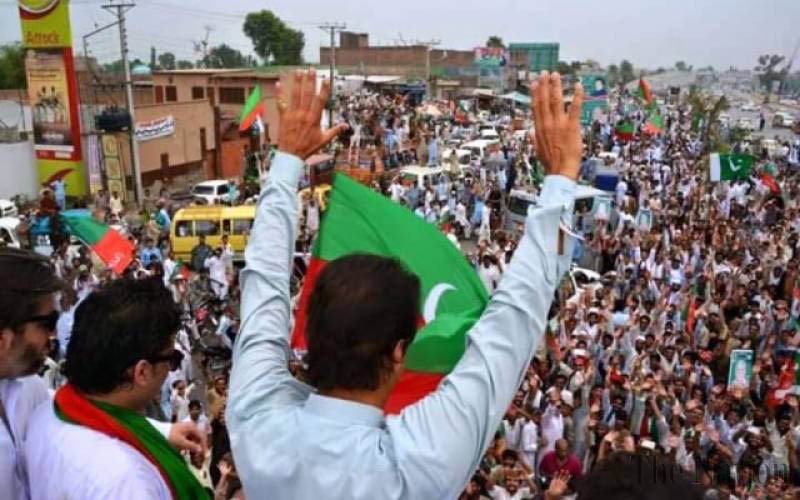
The PTI’s politics antics have taken a back seat in the face of the emerging security concerns after the Quetta attack

As Pakistan Tehreek-e-Insaf (PTI), one of the main opposition parties, is all set to stage its political show in Islamabad on Independence Day, the security situation of the country has once again changed the political landscape.
Following the Quetta blast outside the Sandeman Provincial Hospital that took at least 70 lives last week, PTI’s rally for across the board accountability and probe into Panama Papers’ list of as many as 500 Pakistanis owning offshore companies has lost all steam. The political debate is now more focused on the implementation of the National Action Plan (NAP), counterterrorism and fixing responsibility on intelligence agencies for such attacks.
The PTI has announced to protest till Prime Minister Nawaz Sharif is not ready to present himself and his family for accountability.
"The political atmosphere has changed after the Quetta blast. Security is obviously a major concern and priority and in this situation. PTI’s agitation move has to lie low and the ruling PML-N is given a respite," says Zahid Hussain, political and security analyst views. On the other hand, he says, terrorism is not the main focus of PTI’s politics. "The PTI has ambiguous position on terrorism, despite the fact it agreed on all points of the NAP points. But it has not given full support to it yet."
As for the Pakistan People’s Party (PPP), it has already taken a back seat in the politics of opposition parties.
Earlier on, the opposition parties had showed unity following the Panama Papers disclosure. The ruling PML-N rejected the opposition’s demands saying these are attempts to derail the government and politically target PM Sharif. However, opposition parties could not evolve a consensus on the strategy and the mode of opposition. The PPP was against demanding the resignation of PM Sharif and run an agitation movement while the PTI opted for showing its street power to keep the political pressure up.
In early 2016, the Panama papers exposed as many as 500 rich Pakistanis owning offshore companies abroad, including all three children of the country’s three-time elected Prime Minister Mian Muhammad Nawaz Sharif.
In an attempt to change the ongoing anti-corruption and pro-accountability discourse, head of Balochistan based Pakhtunkhwa Milli Awami Party (PkMAP), Mahmood Khan Achakzai, shifted responsibility of this attack on intelligence agencies for professional negligence in controlling such attacks. Only blaming Indian intelligence agency RAW for such attacks will not work, he said, while urging PM to remove heads of these intelligence agencies of they fail to deliver. He was of the view that Pakistani security forces and intelligence networks will also have to do their job rather blaming others for these activities. Jamiat Ulema-e-Islam Fazlur Rehman (JU-IF) chief of Balochistan province Gul Naseeb Khan also declared this massive and planed attack a failure of Pakistani agencies and demanded proper strategy to counter terrorism.
Zahid Hussain, however, believes that the debate change in political tones and discussion on the role of intelligence agencies will not take the shape of a political discourse in the coming days "because controlled media is setting a particular narrative on this issue already and the ruling party will always be happy for this blame".
Dr Mohammad Waseem, professor of Political Science at LUMS, also feels that the political situation will remain more of the same. He believes that the PTI has lost the initiative on the issue of Panama Papers due to various reasons including one major that the news worthiness of this issue is gone with the passage of time. "Also, this issue is over because the PM remained away from the country for weeks; meanwhile people got to know that the PTI leadership also owns offshore companies," he says. "The PTI lost its high moral ground after these disclosures."
Waseem also views that the PPP is only with the PTI to give the impression that it is with the opposition. "On the other hand, the PPP will shy away from pushing matters because of fear of army. Politics will go slow on Panama issue. The point is that whole politics of the PTI is on keeping itself visible that it should remain afloat," he says.
Moreover, the current political situation has further marred the political shows of the PTI in the backdrop of civil-military relations debate. "Following Achakzai’s statement, a loud message has been given by the military that they are in the driving seat and PM Sharif has responded to this message while appreciating the role of intelligence agencies and security forces in countering terrorism."
In the larger scene the pattern is that, gradually, "the civil regime has to concede to military establishment in Pakistan. The civil government has to adjust with this pattern while learning from debates after such attacks that who controls things," Waseem maintains.